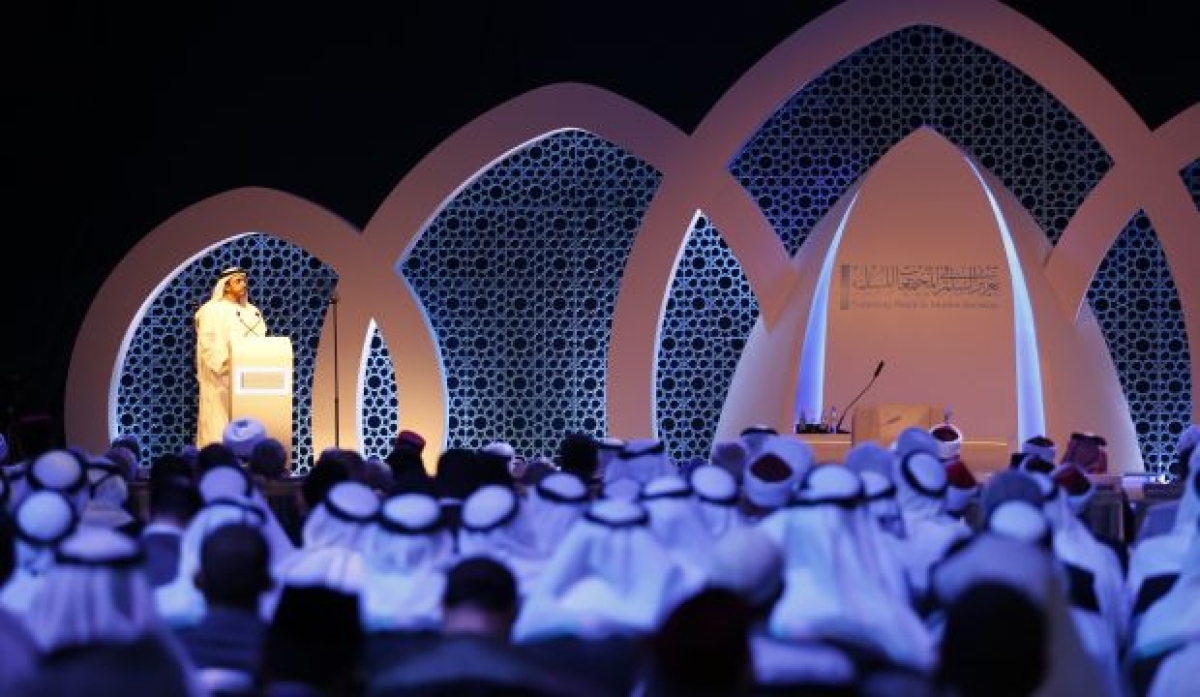 The United Arab Emirates Minister of Foreign Affairs, Sheikh Abdullah bin Zayed al-Nahyan speaks during the opening session of a two-day forum entitled "Promoting Peace in Muslim Societies" on March 9, 2014 in Abu Dhabi. (KARIM SAHIB/AFP/Getty Images)[/caption]
The United Arab Emirates Minister of Foreign Affairs, Sheikh Abdullah bin Zayed al-Nahyan speaks during the opening session of a two-day forum entitled "Promoting Peace in Muslim Societies" on March 9, 2014 in Abu Dhabi. (KARIM SAHIB/AFP/Getty Images)[/caption]
Some British media reports recently asserted that Saudi Arabia was funding (ISIS), which has declared a caliphate in the territory it holds and is seeking the demise of the House of Saud. The claim has been repeated so often that the Saudi embassy in London responded by issuing a statement denying that Riyadh supports ISIS.
According to Mohamed Elsanousi, the director of external relations at the Network of Religious and Traditional Peacemakers, widespread suspicion of Saudi ties to radicals persists in large part because fifteen of the nineteen hijackers on 9/11 were Saudi. That is one reason why, he says, “it’s critical for Muslim societies to engage in a discussion about promoting peace.”
Elsanousi was in attendance at a conference in March at a luxurious resort in the United Arab Emirates to discuss the deadly divisions plaguing Muslim communities. The conference was attended by 250 Muslim religious scholars from across the region.
“Promoting Peace in Muslim Societies” was convened by Emirati Foreign Minister Sheikh Abdullah Bin Zayed Al Nahyan. It was led by the esteemed Mauritania-born scholar and jurist Sheikh Abdullah Bin Bayyah. The gathering was yet another effort to harness the authority of traditional Islamic religious leaders in the battle against Islamic extremism.
It was also another attempt to alter the belief among many Westerners that Gulf governments clandestinely support violent Islamist militants. While some groups reportedly receiving aid from the Gulf are problematic, intolerant and not conducive to Muslim unity, it is very unlikely that violent extremists are being patronized by Gulf powers.
The gathering drew prestigious Muslim clerics—Sunnis, Shi’ites, Salafists and Sufists—from around the world. A large delegation from Al-Azhar University in Cairo and some Saudi religious scholars also attended.
But can such gatherings actually change much on the ground? Elsanousi, who lives in the United States and works with traditional Islamic leaders, said he believes they can. He is especially hopeful about the recent conference in Abu Dhabi, first of all because of the leadership of Sheikh Abdullah Bin Bayyah, whom Elsanousi describes as “a giant” in Muslim scholarly circles.
Sheikh Abdullah Bin Bayyah heads the London-based Global Center for Renewal and Guidance, which focuses on Islamic jurisprudence relevant to modern life. He is also a part-time resident of Jeddah, Saudi Arabia, where he teaches at King Abdulaziz University.
In 2010, Sheikh Abdullah Bin Bayyah led an international conference of religious scholars in Mardin, Turkey, who examined a fourteenth-century fatwa from Ibn Taymiyah that was being cited repeatedly by Al-Qaeda to justify its terrorist activities.
The attendees issued a statement called “Challenging the Al-Qaeda Narrative: The New Mardin Declaration,” which stated that “anyone who seeks support from this fatwa for killing Muslims or non-Muslims has erred in his interpretation and has misapplied the revealed texts.” It went on to say it was the responsibility of Islamic religious scholars “to condemn all forms of violent attempts-to-change or violent protest, within or outside Muslim societies. Such condemnation must be clear, explicit and be a true manifestation of real courage in speaking the truth, so as to eliminate any confusion or ambiguity.” Predictably, the declaration was dismissed and ridiculed by Al-Qaeda, Elsanousi said.
In September 2013, Sheikh Abdullah Bin Bayyah resigned from his position as vice-president of the International Union of Muslim Scholars “because his rhetoric of peace and reconciliation was not fitting with the direction which the Union takes,” Elsanousi said. “He wanted the Union to be more neutral.”
The Union is led by Egyptian-born Yusuf Al-Qaradawi, who is closely associated with the Egyptian Muslim Brotherhood. Under his leadership the Union has been very outspoken against the July 2013 ouster of Brotherhood figure Mohamed Mursi, Egypt’s first democratically elected president.
Elsanousi said another reason he was confident the March conference would be effective is that Sheikh Abdullah was organizing a “Council of the Wise” to implement its decisions. Council members will act as “firefighters” to stop violent conflicts in Muslim countries, he said, adding that their mission will not include attributing blame. “When firefighters come they don’t ask who started the fire—they put it out,” Elsanousi quoted Sheikh Abdullah as saying.
Conferences are all well and good, but much more needs to be done to counter the pull of extremism among Arab and African youth and to change the image of Islam in the West. Religious scholars who have influence in their communities should be given much higher visibility in Western and Arab media. And they need to be more consistently outspoken in promoting reconciliation among all Muslim groups and sects that reject violence.
Finally, if Muslim religious scholars are to have credibility among the hopeless, jobless and frustrated youths of the Arab world, they must be more assertive about the need to meet the needs of these youths, be it jobs, homes or space for intellectual creativity and political participation.
It is only by showing they are fighting for justice for these youths will traditional Muslim religious leaders begin to match the pull of radicals luring young Muslim people into anarchistic jihads.
All views expressed in this blog post are those of the author and do not necessarily represent the views of, and should not be attributed to, The Majalla magazine.









